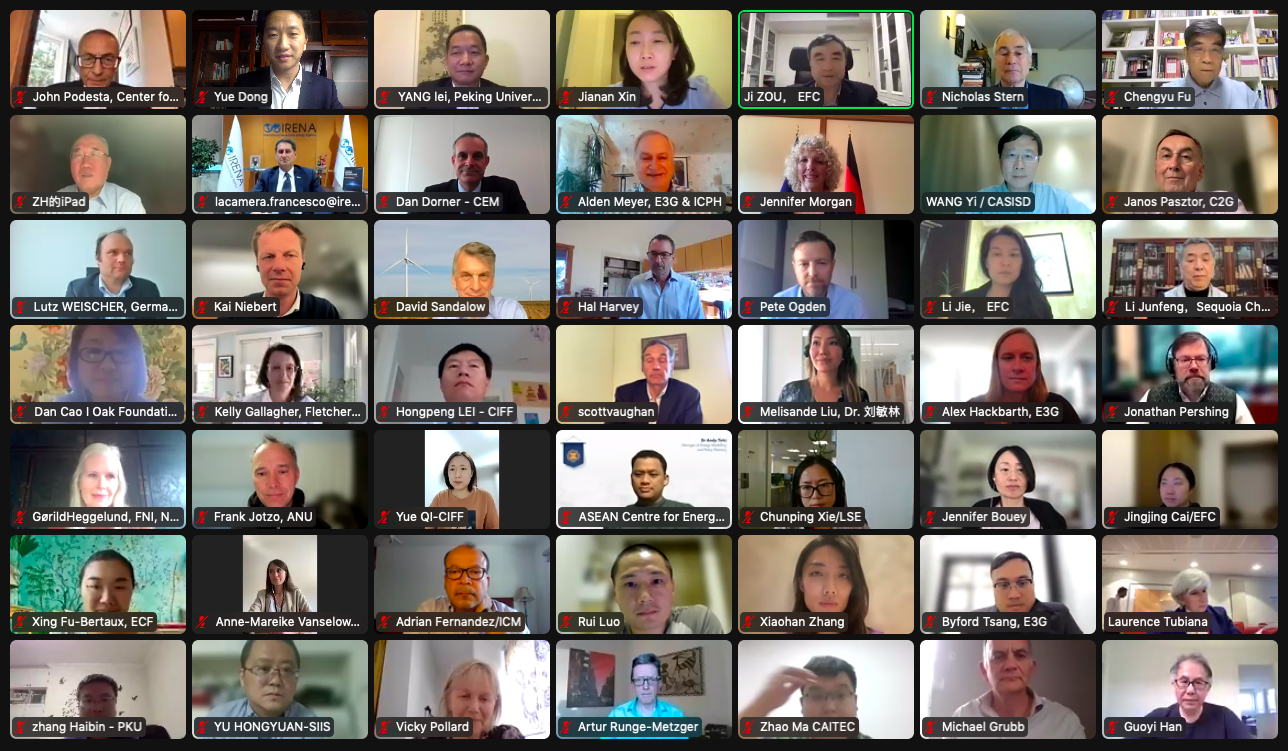150 International Experts Discussed Energy Security Lessons From the Geopolitical Crisis
The climate policy research group—led by Energy Foundation China, Children’s Investment Fund Foundation, and the Institutes of Science and Development of the Chinese Academy of Sciences—of the China Council for International Cooperation on Environment and Development (CCICED) and the council’s secretariat held a China-international joint expert meeting themed on “Lessons From the Geopolitical Crisis: Renewables for Energy Security” on May 18 and 20, 2022. Over 150 experts from more than 20 countries and regions, including China, the United States, Germany, France, the United Kingdom, Brazil, Mexico, and South Africa, attended the online meeting and held candid discussions on the impact and solutions of the current energy crisis.

Experts agreed that to address climate change and drive the global energy transition, coordination would be required between the current and longer-term interests to advance systemic reforms. When tackling climate change, countries needed to deal with the relationships between economic growth and emissions reductions, between bigger-picture issues and local interests, and between shorter-term and longer-term priorities, the experts said. Countries also needed to strike the balance between climate action and energy, food, and supply chain securities, so as to realize coordinated development in economic, social, environmental, energy, food, health, and technological aspects. In the short term, countries might still resort to fossil fuels for energy security reasons, but that would not slow down the inevitable energy transition, according to the experts.
The experts emphasized that we should turn the crisis into an opportunity, and deploy clean energy to serve the multiple purposes of energy security, climate mitigation, and economic recovery. To accelerate renewable energy expansion, clear and stable policy expectations should be established to boost investment confidence and enthusiasm from parties such as local governments, enterprises, and research institutions, according to the experts. Countries should reduce trade barriers on renewable energy equipment and products, which would be conducive to stable global supply chains, and therefore helpful for reducing the cost of the energy transition, they said.
Experts also pointed out the fact that the international climate cooperation was now faced with many difficulties and suitable channels for contact and exchange should be explored in the new situation. With renewable energy being a common interest for China and other countries, renewable technologies could be developed in benign competition to drive cost reduction, improve quality, and enhance efficiency. For policy discussions, the Track II mechanism could be used on the sidelines of intergovernmental talks, for communication and cooperation among local governments, enterprises, and think tanks on power pricing policies, green hydrogen, sustainable agriculture, and other topics. China should also cooperate with other countries to develop clean energy projects in developing countries and help them phase out coal use, improve energy efficiency, and deploy renewable energy. Meanwhile, China should be engaged in and promote the climate agenda on multilateral platforms, and accelerate international agreements on methane, forests, and other important topics, said the experts.
Participants of the meeting included Xie Zhenhua, Vice President of CCICED and China’s Special Envoy for Climate Change; Liu Shijin, CCICED’s Chinese Chief Advisor; Fu Chengyu, Former Chair of the China Petroleum and Chemical Corp; Fatih Birol, Executive Director of the International Energy Agency; John Podesta, Former U.S. White House Chief of Staff and Founder and Chair of the Board of Directors for the Center for American Progress; Scott Vaughan, CCICED’s International Chief Advisor; Lord Nicholas Stern, Chair of the Grantham Research Institute on Climate Change and Environment, London School of Economics and Political Science; Laurence Tubiana, CEO of the European Climate Foundation; and Jennifer Morgan, Special Envoy for International Climate Action for Germany. The meeting was moderated jointly by Wang Yi, Member of the Standing Committee of the13th National People’s Congress of China, Vice Chairperson of the National Expert Committee on Climate Change, and Professor of Institutes of Science and Development, Chinese Academy of Sciences; Kate Hampton, CCICED Member and CEO of the Children’s Investment Fund Foundation; Zou Ji, CCICED Special Advisor, President and CEO of Energy Foundation China; Bernice Lee, CCICED Special Advisor and Research Director for Futures, Hoffmann Distinguished Fellow for Sustainability, and Chair of the Chatham House Sustainability Accelerator Advisory Board; and Kelly Sims Gallagher, Academic Dean of the Fletcher School, Professor of Energy and Environmental Policy, Director of Climate Policy Lab, and Co-Director of CIERP, Tufts University.




